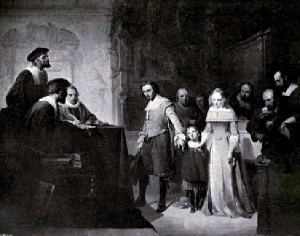On Mondays, I answer questions frequently asked by those considering a return to the Catholic Church. How do I know this stuff? I was away for more than 30 years myself, and am the co-author of When They Come Home: Ways to Welcome Returning Catholics, a book for pastors and parish leaders interested in this ministry.
What’s involved in getting an annulment?
First, a bit of a refresher. If you were married by a priest or deacon and since have divorced, you’ll need an annulment to remarry in the Church (or to have an existing subsequent civil marriage recognized).
You start the process by contacting your parish about the procedure in your diocese. Generally, you’ll be asked about the reason your  marriage should be declared null. What was missing from the relationship at the beginning that prevented it from being a true marital bond? Did both parties welcome the possibility of children? Were there any undue pressures such as a pregnancy that prevented clear thinking at the time? Were there mental or other problems that got in the way of your judgment? Did you both believe in the permanence of the marital bond at the time of the marriage? What red flags existed that you didn’t take seriously enough at the time?
marriage should be declared null. What was missing from the relationship at the beginning that prevented it from being a true marital bond? Did both parties welcome the possibility of children? Were there any undue pressures such as a pregnancy that prevented clear thinking at the time? Were there mental or other problems that got in the way of your judgment? Did you both believe in the permanence of the marital bond at the time of the marriage? What red flags existed that you didn’t take seriously enough at the time?
In addition to your own written and oral testimony, the tribunal will contact your ex-spouse and others who were familiar with your marriage. It’s not required that your ex respond, but it is essential that he or she be contacted.
The annulment process’s purpose is to determine whether a true marriage existed. If the tribunal finds no evidence that it did not, the marriage will not be annulled.
The process can take months or even years in some dioceses. If you have divorced, you might consider seeking an annulment as soon as you are spiritually ready, rather than waiting until a time when you are in love again and want to be married in the Church. Also, keep in mind that an annulment is not a “Catholic divorce”; you’ll still need a court-approved end to the marriage for legal, civil purposes.
The purpose of all this examination is not to make you feel worse that your marriage failed or to punish you in any way. Anyone who’s been divorced understands that ending a marriage, even a flawed marriage, results in feelings of sadness and anger and perhaps guilt. Examining where things went wrong can be healing and can help you build a better marriage the next time.
Be aware that an annulment typically will involve a fee. The fee varies by diocese. This isn’t an attempt to make you feel guilty or to “buy” your way out of a marriage. The fee is used to defray the costs associated with the tribunal’s investigation and discernment.
The timeline is likely to be simplified at least somewhat after December 8 due to changes announced by Pope Francis earlier this month. Talk with your pastor about the ramifications for your situation.
Not all annulments require this level of examination. If you are Catholic but your ex-spouse was not, and your wedding was not held in a Christian church, and you did not receive your bishop’s permission to marry outside the Church, the process is much simpler. You’ll be asked to produce your baptismal certificate; your marriage certificate; and your divorce decree. No cooperation or participation from your ex-spouse is needed. The process from there can take a matter of days or weeks.



{ 0 comments… add one now }